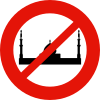
Back تدنيس القرآن Arabic سووکایەتی بە قورئان CKB هتک حرمت قرآن Persian השחתת הקוראן HE Penodaan Al-Qur'an ID Осквернение Корана Russian การดูหมิ่นอัลกุรอาน Thai Kuran'a saygısızlık Turkish 亵渎古兰经 Chinese

| Quran |
|---|
| Part of a series on |
| Islamophobia |
|---|
 |
Quran desecration is the treatment of the Quran in a way that might be considered insulting.
In Islamic law, believers must not damage the Quran and must perform a ritual washing before touching it.[1] Conversely, intentionally damaging copies is considered blasphemous in Islam. It is a point of controversy whether non-Muslims should be made to follow Islamic law,[2] and a sensitive topic in international relations how it should be handled when Muslims demand adherence to Islamic Quranic practices by nonbelievers.[3][4][5]
The disposal of worn copies is also of concern to Muslims. Because the Quran contains no specifics on how to dispose of a worn or defective text, different and conflicting methods of disposal have been adopted in different regions by different sects. According to Islamic historian Michael Cook the Quran should be wrapped in cloth and buried on holy ground where it is unlikely to be trampled on or "safely" placed where it is unlikely to come into contact with impurity.[1] Burning, when carried out respectfully, is also considered acceptable,[6] and Saudi Arabia, for instance, destroys Qurans that fall short of state standards by burning to avoid soiling the pages.[7][8]
Intentionally desecrating a copy of the Quran results in imprisonment as punishment in some countries and might result in a death sentence in Afghanistan, Saudi Arabia, Somalia, and Pakistan, or up to life imprisonment in Pakistan, according to Article 295-B of the Penal Code.[9][10][clarification needed]
- ^ a b Myrvold, Kristina (2010). The Death of Sacred Texts: Ritual Disposal and Renovation of Texts in World. Farnham Surrey England: Ashgate Publishing. pp. 31–57. ISBN 9780754669180.
- ^ Hansen, Lene. "The politics of securitization and the Muhammad cartoon crisis: A post-structuralist perspective." Security Dialogue 42.4-5 (2011): 357-369.
- ^ Blue Holmes, Catherine. "Quran Burning and Religious Hatred: A Comparison of American International, and European Approaches to Freedom of Speech." Wash. U. Global Stud. L. Rev. 11 (2012): 459.
- ^ Al-Rawi, Ahmed. "The Online Response to the Quran Burning Incidents." Political Islam and Global Media: The boundaries of religious identity (2016): 105-21.
- ^ Hansen, Lene. "Theorizing the image for security studies: Visual securitization and the Muhammad cartoon crisis." European journal of international relations 17.1 (2011): 51-74.
- ^ "Disposing of the sheets of Quran". ourdialogue.com. Archived from the original on 13 August 2006. Reprint from Our Dialogue Q&A series, Adil Salahi, Arab News, Jeddah
- ^ Dissing the Koran, The Weekly Standard, May 30, 2005, retrieved Feb 7 2012
- ^ "Back". Archived from the original on 1999-10-09. Retrieved 2005-05-25.
- ^ Cite error: The named reference
Reutwas invoked but never defined (see the help page). - ^ Cite error: The named reference
BBCwas invoked but never defined (see the help page).
© MMXXIII Rich X Search. We shall prevail. All rights reserved. Rich X Search